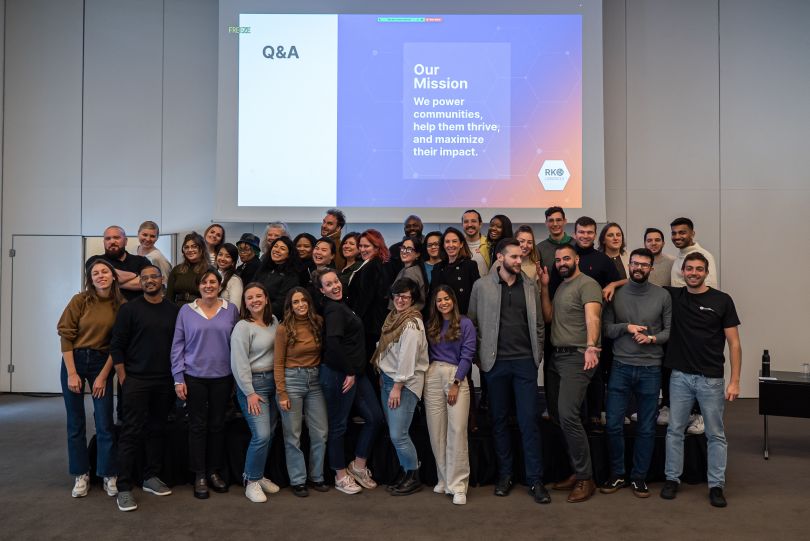Before she became a customer success manager at Hivebrite, Chelsea Choppy spent six years working in alumni relations. At first, she experienced some imposter syndrome, uncertain about the steep learning curve in her new role.
But soon, Choppy realized that her work in alumni relations gave her an inside look at how clients could actually use the product, creating practical solutions to on-the-ground problems.
“If you're trying to break into a CSM role, remember that in today's world, transferable skills matter more than ever,” Choppy told Built In.
Customer success management is a fast-growing role in the tech sector, and it requires a particular skill set. Dominek Tubbs, senior team lead at Squarespace, likes the dynamic nature of her CSM work.
“Every day, you encounter new challenges, and working with different teams requires a great deal of flexibility,” she said.
For Tubbs, problem-solving, decision-making and teamwork are the most important skills to navigate the ever-changing landscape of CSM work. She uses her professional development time to enroll in courses designed to help her brush up on project management and problem-solving.
If you’re interested in breaking into a CSM role in the tech sector, these two CSM dynamos shared plenty more great tips for navigating the transition with Built In.
Squarespace is a SaaS-based content management system offering a website builder, blogging platform and hosting service.
In your own words, what does a customer success manager do? Is there anything unique to being a CSM at your company?
The main objective of a customer success manager is to improve the customer’s experience and reduce customer churn while also increasing the chances of upselling and cross-selling.
Each company should have something unique about its CSM program. At Squarespace, we recently established our customer success team and have witnessed significant progress in our customer success specialists' level of personalization in outreach to customers. They help customers understand the value of amplifying their brand and business voice.
What are 2-3 skills every good customer success manager must have?
The most critical skills are problem-solving, decision-making and teamwork. Every day, you encounter new challenges, and working with different teams requires a great deal of flexibility.
Every day, you encounter new challenges, and working with different teams requires a great deal of flexibility.”
Being well-versed in problem-solving skills helps move away from discovering a problem to creating a viable solution. Decision-making is another critical skill, as you often need to make decisions with either an expansive amount of data or little to no data. Finally, teamwork is a crucial skill. Customer success involves a lot of cross-team collaboration to reach a shared goal.
What was the biggest challenge you faced when breaking into this role? How did you overcome it?
The most difficult challenge I encountered was converting seemingly abstract concepts into actionable tasks with a clear objective. In my previous company, where I was responsible for managing customer success, I used my professional development time to refine my skills by taking courses in problem-solving and project management. Additionally, I had a mentor who helped me stay on track with my professional goals.

Hivebrite is an online platform for organizations to manage events, data and content.
In your own words, what does a customer success manager do? Is there anything unique to being a CSM at your company?
The CSM role is like a box of chocolates — it varies as much as companies and products do. Depending on the company's stage and the client segment they handle, CSMs may find themselves tasked with anything from onboarding to support functions. At its essence, the primary function of a CSM remains constant; demonstrating value to customers.
At Hivebrite, CSMs are akin to community management consultants given that our product is an all-in-one community management solution. While product discussions and escalations are inherently part of the job, our focus leans more towards consulting.
We guide discussions in a way that helps clients identify their goals and explore pathways to achieve them. This approach not only aids customers in growth and goal attainment but also strengthens their relationship with our company.
While occasional intervention in support tickets is necessary, our primary focus lies in understanding customer needs and collecting valuable feedback. This information is then relayed to our product team to shape the future roadmap and elevate our solution to the next level.
What are 2-3 skills every good customer success manager must have?
Storytelling: Being able to tell a persuasive and effective story is incredibly powerful. We generally think about the importance of storytelling when interpreting data during quarterly business reviews, but it is equally important when it comes to difficult decisions. For example, it allows us to convey product prioritizations in a way that resonates with clients and gets them excited about the changes to come, even if their specific requests are not currently part of that vision.
Empathy/Emotional intelligence: Remember Maya Angelou's words, "People will forget what you said, people will forget what you did, but people will never forget how you made them feel." While likability alone won't prevent churn, over time, empathy cultivates trust, shapes a positive customer experience and fosters loyalty.
While likability alone won't prevent churn, over time, empathy cultivates trust, shapes a positive customer experience and fosters loyalty.”
More importantly, this emotional connection encourages clients to share feedback, providing more opportunities to understand and assist them effectively. Importantly, empathy plays a pivotal role in transforming clients into advocates, as positive experiences and genuine connections prompt them to champion your brand.
What was the biggest challenge you faced when breaking into this role? How did you overcome it?
Before I joined Hivebrite, I spent six years in alumni relations, where I gained hands-on experience using community management solutions from a client's perspective. Despite collaborating with our CSM during that period, I had never actually been a CSM. While I was well-versed in community engagement, I knew there was a learning curve for CSM responsibilities and diving into our product.
Initially, there was a bit of imposter syndrome, but learning more about the product helped me realize the value of my extensive community management experience and boosted my confidence. My industry know-how allows me to show our clients how to use our product to tackle their challenges in practical ways that I can relate to, which has helped me build those meaningful relationships.
If you're trying to break into a CSM role, remember that in today's world, transferable skills matter more than ever. Take a moment now and then to recognize where your strengths lie and how they add value. Your unique skills and experiences bring something special to the mix, making the team stronger. Embrace those transferable skills—they're the key to thriving in the dynamic field of customer success.









